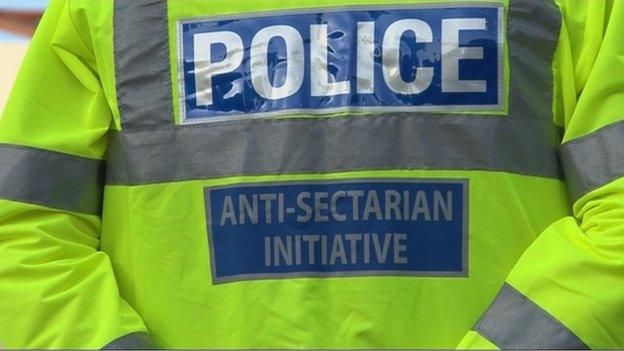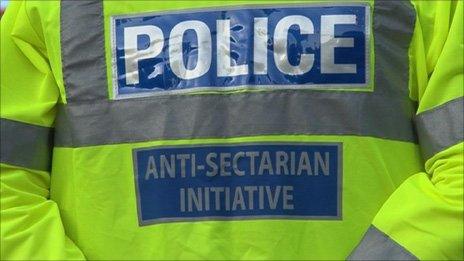Fall in Scottish football hate crime charges
- Published

The number of people charged under the controversial football hate crime legislation has fallen slightly, according to Crown Office figures.
They showed 193 people - all but four of them men - were charged in the year to the end of March.
That number was down from 206 in 2013/14 and 267 the previous year.
The figures showed that the accused had an affiliation with Rangers in 30% of the charges, Aberdeen in 16%, Celtic in 10% and Hibernian in 8%.
Some 16% of all charges were connected to the Dundee United versus Aberdeen match in December last year.
A further 7% were connected to Hamilton v Motherwell in September and 7% to the Scotland v England match in November.
Court proceedings have begun in relation to 168 of the 193 charges.
'Hateful behaviour'
The report on the figures said the average age of the accused had risen from 23 to 27.
Offensive Behaviour at Football and Threatening Communications (Scotland) Act 2012 criminalises hateful, threatening and otherwise offensive behaviour that is likely to incite public disorder in relation to football.
Last year people were accused of offences that were "threatening" in 61% of the charges and "hateful" in 30% of charges.
Behaviour was described as "otherwise offensive" - for example including a reference to celebration of loss of life or support of terrorist organisations - in 13% of charges.
Of the 58 charges relating to "hateful" behaviour, 50 charges involved incidents of religious hatred, down on previous years, while 4% involved racial hatred, and no charges involved sexual orientation.
As in the previous two years, derogatory behaviour towards Roman Catholicism (84%) accounted for the largest proportion of religious abuse.
Academic evaluation
Six charges (12%) included behaviour that was derogatory towards Protestantism.
One charge included derogatory behaviour towards Judaism, and one charge included derogatory behaviour towards Islam.
Fewer charges occurred in football stadiums than in previous years, with the majority relating to incidents outside grounds or in town or city centres on match days.
An academic evaluation of the act, published by the Scottish government, said football fans said they had not noticed any significant decrease in the amount of problematic behaviour since the new laws had come into force.
The report also said police and stewards in football grounds appeared to be concentrating on groups of young fans - terming them risk groups - and losing focus on more serious offenders, perhaps away from stadiums.
There has also been some criticism of the act from within the legal profession, with some sheriffs "emphatically critical" of it. Successful prosecutions have fallen from 73% to 52%.
Minister for Community Safety Paul Wheelhouse said: "We have seen a raft of encouraging statistics and evidence published today showing that hate crimes in Scotland are on the decrease, both on the streets of Scotland and in our football grounds and this is to be welcomed.
"Religious crimes are down, race crimes are down, crimes in relation to sexuality are down and we've seen a decrease in crimes of offensive behaviour at regulated football matches in Scotland. Whilst the legislation we brought in two years ago has had its critics, the latest statistics show a steady decline in offences at stadiums and a YouGov poll shows 80% of Scots support the Offensive Behaviour Act."
"We will not be complacent and will continue to monitor how the act is working very closely going forward. However, I believe the legislation is working. The evaluations, backed by the latest statistics out today, demonstrate that the act has had a positive impact and our approach has delivered real improvements in behaviour at football and online."
- Published5 November 2013

- Published14 June 2013

- Published2 March 2012
